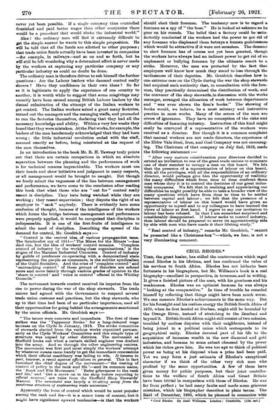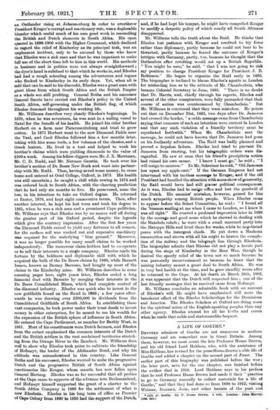CECIL RHODES.*
Theis, -the great heeler, has stilled the controversies which raged round Rhodes in his lifetime, and has confirmed the value of his services to South Africa. Rhodes has not hitherto been fortunate in his biographers, but Mr. Williams's book hi a real biography—excellent in perspective, in terseness, and- in writing. It gives a finished picture of the man, with his greatness and his weaknesses. Rhodes was an optimist because he was always " looking-at the comparative." In time of trouble he consoled himself by reflecting that things might have been much worse. We can measure Rhodes's achieVeniehts hi the tarne'eray. 'Bet for his foresight and his restless energy the British'South Afrita of 1870,iwhen -he first landed at Durban, might still be bounded by the Orange River, instead • of stretching to the Zambezi and beyond it. Mash South-Africa' might still consist Of two colonies, troubled by endless disputes' with their neiglibotirs, instead of being joined in a political union which' oorresponds to its geographical unity. Rhodes devoted part of his life to the acquisition of immense wealth in the new diamond and gold industries,. and became to some extent ON:ease& by the power which: his riches gave him. He was too 'apt to think of political power as being at his disposal when a price had been paid. Yet we may form a just estimate of Rhodes's exceptional character if we think of the other very rich men who profited by the sate opportunities. A few 'of them have given money- for public purposes, but their joint -on:Arbil- tions to the welfare of South Africa and Great Britain hale been trivial in comparison with those -of Rhodes. He' was far front perfect; • he had many faults and made some grievous mistakes, which his biographer describes in plain terms. The Raid of December; 1895, which he planned in- connexion with • OseR Rhodes. By Basil W1111asas. Loialon : Constable. lilt, nal.]
an Outlander rising at Johannesburg - in order to overthrow President Kruger's corrupt and reactionary rule, was a deplorable blunder which undid much of his own good work in reconciling the British and Dutch elements in South Africa. His open quarrel in 1899-1900 with the Higher Command, which declined to regard the relief of Kimberley as its principal task, was an unpleasant incident, only to be excused by those who knew that Rhodes-was a sick man and that he was impatient to make full use of the short time left to him in this world. His methods in business and in politics were not always straightforward ; the dyer's hand is subdued to that which he works in, and Rhodes had had a rough schooling among the adventurers and rogues who flocked to Kimberley in its early days. Yet, when all is said that can be said to his discredit, Rhodes was a great man with great ideas from which South Africa and the British Empire as a whole are still profiting. General Botha and his suooessor General Smuts have carried out Rhodes's policy in the United South Africa, self-governing under the British flag, . of which Rhodes dreamed throughout his working life,
Mr. Williams describes very clearly- Rhodes's beginnings. In 1870, when he was seventeen, he was sent in a sailing vessel to Natal for the benefit of his health. He joined his elder brother Herbert on . a farm near Pietermaritzburg and tried to grow cotton. In 1871 Herbert went to the new Diamond Fields near the Vaal, and Cecil Rhodes followed him a few months later, taking with him some tools, a few volumes of the classics, and a Greek lexicon. He lived in a tent and helped to work his brother's claims which were yielding diamonds .to the value of £100 a, week. Among his fellow-diggers were Mr. J. X. Merriman, Mr. C. D. Rudd, and Mr. Norman Garstin. He took over ins brother's section of-De Beers New Rush and went into partner- ship with Mr. Rudd. Then, having saved some money, he came home and entered at Oriel College, Oxford, in 1873. His health was still uncertain ; he caught a chill while rowing in 1874 and was ordered back to South Africa, with the-cheering prediction that he had only six months -to live. He persevered, none the less, in his intention to take an Oxford degree. Re returned at Easter, 1876, and kept eight consecutive terms. Then, after another interval, he kept his last term and took his degree in 1881, when he was a rich man and a prominent Cape politician. Mr. Williams says that Rhodes was by no means well off during the greater part of his Oxford period, despite the legends which give the contrary impression. After the first few years the Diamond Fields ceased to yield easy fortunes to all comers, for the surface soil was worked out and expensive machinery was required for the underlying " blue ground." Moreover, it was no longer possible for many small claims to be worked independently. The numerous claim-holders had to co-operate or to sell their interests to a single company. Rhodes made his fortune by the boldness and diplomatic skill with which he acquired the bulk of the De Beers claims by 1880, while Barnett Isaacs, known as Barney Barnato, had bought up most of the claims in the Kimberley. mine. Mr. Williams describes in some amusing pages how, eight years later, Rhodes ended a long financial duel with Barnato by merging their interests in the De. Beers Consolidated lanes, which had complete control of the diamond industry. Rhodes was quick also to invest in the new goldfields found on the Rand in 1886 ; a few years after- wards be was drawing over £300,000 in dividends from the Consolidated Goldfields of South Africa. In establishing these vast companies, he took power under their trust deeds to invest money in other enterprises, for he meant to use his wealth for the expansion of the British sphere of influence in South Africa. He entered the Cape Parliament, as member for Barkly West, in 1881. Most of his constituents were Dutch farmers, and Rhodes from the outset emphasized the common interests of the Dutch and the British settlers in the vast unclaimed territories stretch- ing from the Orange River to the Zambezi. Mr. Williams does well to show why Rhodes took pains to cultivate the friendship of Hofmeyr, the leader of the Afrikander Bond,. and why his attitude was misunderstood in this country. Like General Botha and his successor, Rhodes wanted to unite the progressive Dutch and the progressive British of South Africa against reactionaries like Kruger, whose mantle has now fallen upon General Hertzog. Rhodes was ,so far successful that all parties at the Cape came to approve of the advance into Bechuanaland, and Hohneyr himself supported the grant of a charter to the South Africa Company in 1889 for the settlement of what is now Rhodesia. Rhodes in his long term of office as Premier of Cape Colony from 1890 to. 1896 had the support of the Dutch,
and, if he had kept his temper, he might have compelled Kruger to modify a despotic policy of which nearly all South Africans disapproved.
Mr. Williams tells the truth about the Raid. He thinks that Rhodes lost patience with Kruger and resolved to try force
rather than diplomacy, partly because he could not bear to be thwarted, partly because he feared the outcome of Kruger's intrigue with Germany, partly, too, because he thought that the Outlanders after revolting would set up a British Republic. " You might be sure," he said, " that I was not going to risk my position to change President Kruger for President J. B. Robinson." He began to organize the Raid early in 1895, The biographer is inclined to blame Rhodes's agents in London for misleading him as to the attitude of Mr. Chamberlain, who became Colonial Secretary in June, 1895. " There is, no doubt that 'Dr. Harris, and, chiefly through his reports, Rhodes and several of the other conspirators, were fully persuaded that their course 9f action was countenanced by Chamberlain." But Mr. Williams is convinced that they were mistaken. He points out that on December 31st, 1895, two days after Dr. Jameson had crossed the border, " a cable message ea me-f ren2 Chamberlain saying that rumours of such an intention were current in London and that any such violation of a friendly territory must be repudiated forthwith." When Mr. Chamberlain sent the message,, he could not have known that Dr. Jameson had gone on his foolhardy adventure. The Raid was badly planned and proved a hopeless failure. Rhodes had tried to prevent Dr. Jameson from starting, but his telegraphic orders were dis- regarded. He saw at ono43 that his friend's precipitate action had ruined his own career. " I know I must go," be said ; " I will resign to-morrow." To Mr. Schreiner hesaid, " Old Jameson has upset ray apple-cart." If the German Emperor had not intervened with his tactless message to Kruger, and if the old President had handled the situation with some show of generosity, the Raid would have had still graver political consequences. As it was, Rhodes had to resign office and lost the goodwill of the Dutch. His enemies' mistakes, however, gained for him much sympathy among British people. When Rhodes came to appear before the Select Committee, he said " I found. all the 'buamen smiling at me when I came to London, so I knew it was all right." He created a profound impression later in 1896 by the courage and good sense which he showed in dealing with the Matabele rebels ; he went with a small unarmed party into the Matoppo Hills and lived there for weeks, while he negotiated peace with the insurgent chiefs. He put down a Mashona insurrection and strove with all his might to hasten the comple- tion of the railway and the telegraph line through Rhodesia. The biographer.dmits that;Rhodes did not play a heroic part during the siege of Kimberley in the Boer War, though he desired the, speedy relief of the town not so much because he was personally inconvenienced as because he knew that the mining industry meant a great deal to South Africa. He was in very bad health at the time, and he grew steadily worse after he returned to the Cape. At his death on March 26th, 1902, it was apparent that the Dutch still respected him ; one of the last friendly messages that he received came from Hofmeyr.
Mr. Williams concludes an admirable book with an account of Rhodes's will. He might have emphasized still more the beneficent effect of the Rhodes Scholarships for the Dominions and America. The Rhodes Scholars at Oxford are doing more for the spiritual union of the English-speaking peoples than any other agency. Rhodes atoned for all his faults and errors when he made that noble and statesmanlike bequest.



































 Previous page
Previous page